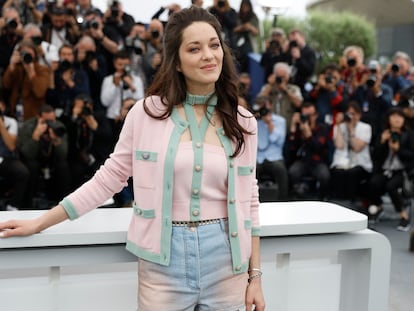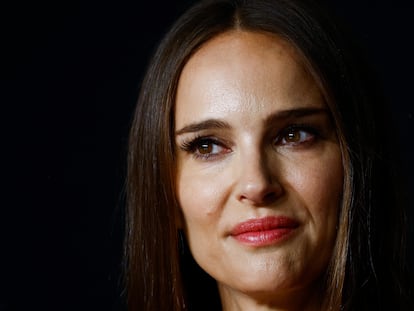The life, death and resurrection of Ethan Hawke’s Hollywood career: ‘I was only 30, and I was washed up’
The star of Pedro Almodóvar’s latest film has been in show business for four decades despite remaining true to his principles and his reluctance to become a mainstream actor
Ethan Hawke is proud of his crooked teeth. When a former agent asked him to fix them, he got angry. “I watched the Oscars on TV a few years ago, and they all looked like they were pod people. They looked so fake. And then crazy Sean Penn got on stage, and I thought to myself, ‘There’s a human being.’” He decided that day that he wouldn’t get his teeth fixed. “I just hate how homogenized people want us all to be. Nobody ever talks about Eleanor Roosevelt’s crooked teeth, because she was a woman of substance. And we don’t talk about how Mother Teresa would have been better if she could have lost 15 pounds, because she was a woman of God.”
In Cannes, among models and Instagram stars with many followers and little filmography, as well as unrealistically white teeth, Hawke looked like a normal person. Or as normal as one can be as a generational icon with four Oscar nominations and a four-decade-long career; an attractive man who formed one of the most beautiful couples of the 1990s with Uma Thurman; a writer, screenwriter, director and musician; Tennessee Williams’ second cousin twice removed; and, above all, a symbol. If Hannah from Girls aspired to be the voice of a generation, Ethan Hawke is, to his regret, the face of generation X, which has been reviled by those who belong to it, depicted by Douglas Coupland and deified by fashion magazines.
Now, at 52, Hawke co-stars in Strange Way of Life, director Pedro Almodóvar’s Western film that just premiered at Cannes. The actor is well-acquainted with the genre (he participated in director Antoine Fuqua’s remake of The Magnificent Seven) and complex relationships. His latest critical success came with the documentary The Last Movie Stars in which he honors icons like Paul Newman and Joanne Woodward and exorcises his own demons.
Unlike Pedro Pascal, his co-star in Strange Way of Life — whom the world discovered in his 40s — Hawke grew up in front of the camera. He is the son of teenage parents. When he was born, his father was 18 and his mother was 17; he was named Ethan because his mother thought the name would look good on the cover of a book.
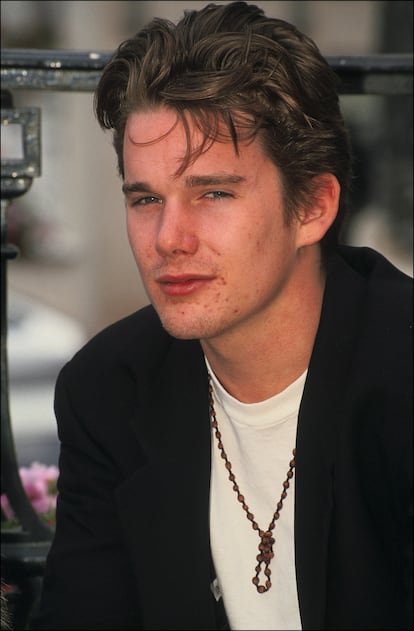
Hawke’s parents separated when he was four years old and he went to live with his mother, who raised him between temporary jobs and lots of social activity: she was a teacher, joined the Peace Corps and founded a charity that helps provide education to Romanian children. Hawke was, and remains, involved in that work and committed to the rights of minorities.
He considers his parents’ separation to be his first acting lesson. To please his father, a deeply religious conservative, he would talk about soccer and religion, even faking a Southern accent. “I wanted him to like me. I was aware that I was performing for him. I hated myself for it,” he told The New Yorker. He played up his intellectual side with his mother, with whom life was unconventional. When he was four and could not yet read, she took him to see Bergman’s Scenes from a Marriage in the original version with subtitles. For his fifth birthday, she chose to take him to watch One Flew Over the Cuckoo’s Nest. When they left the theater, they read Pauline Kael’s vitriolic reviews in The New Yorker together. The contrast between the worlds of his mother and father made Hawke an expert at fitting in everywhere, a contemporary Zelig.
When Hawke was 12, his mother enrolled him in an acting course. Six months later he was starring in Explorers alongside River Phoenix. They became inseparable during filming. “We were sure we were going to be movie stars.” On the day of the premiere, they hid in the lavatory of the Ziegfeld Theater to listen to the reviews; they were not flattering. “America has cast its vote, and Ethan Hawke is not a star,” he heard one executive say.
Hawke’s first film experience did not make him an instant star, but it indirectly taught him a lesson that he surely would have preferred not to receive. He confessed to The Guardian that his aversion to making big Hollywood movies stemmed from Phoenix’s death. “My first screen partner overdosed on Sunset Boulevard, you know? He was the brightest light and this industry chewed him up, and that was a big lesson to me.”
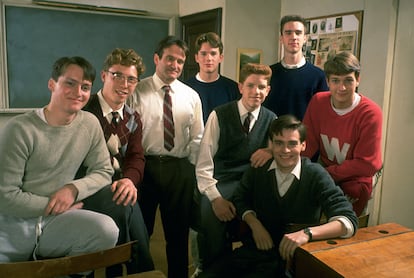
His next audition was for Peter Weir’s Dead Poets Society. After racking up rejections, including the Stand By Me character that Phoenix ended up playing, he decided that if he didn’t get the part, he would join the U.S. Merchant Marine. It didn’t come to that: Weir cast him as Todd Anderson, the shy teenager who, in the final scene, climbs onto his desk and shouts Walt Whitman’s epic “Oh, Captain, my Captain!” The film’s success and influence exceeded all expectations. As he has recounted several times, hardly a day goes by without someone shouting “Carpe diem!” at him.
Such a critical and commercial success — at nearly $250 million at the box office, it is still the highest grossing film of his career — should have made its leading actors instant stars. But it didn’t, and Hawke’s career has been the best of the bunch. As he was trying to find his niche in the industry, he received a phone call from Winona Ryder, who was in Portugal filming House of the Spirits; she wanted him to work with her on Reality Bites (1993). Hawke didn’t understand how someone who had just filmed with Martin Scorsese could get involved in a film by an unknown writer and director.
Reality Bites is a difficult phenomenon to explain. When it was released, critics tore it to shreds and the few viewers who saw it hated it, but now millennial audiences are vindicating the film. Hawke’s character — the insufferable, affected Troy — made him a household name. People took it for granted that if they dressed alike and styled their hair the same way — that carefully ragged look and falsely greasy, disheveled hair that came from many hours spent in front of the mirror — they had to be the same, but that wasn’t a positive thing. Troy was an idiot and, with his affected philosophical chatter, his band, and his refusal to enter the fold while his parents paid his bills, he held a mirror up to the faces of countless humanities students in the mid-1990s.
Reality Bites was a parody within a parody, a product that vampirized grunge nihilism in order to sell cars under the stultifying slogan “young but over-prepared.” In the film, Rider’s character Lelaina chose Hawke, but during shooting, he and Winona, who now appears in Stranger Things with Hawke and his daughter Maya, did not hit it off. “I know a lot of young actors who live in these dumps,” the actress told Rolling Stone. “They have their books scattered and their mattress is on the floor — and they’re millionaires. That’s fine. That’s their way of living. But the reason they’re doing it is that they’re ashamed. And I’ve talked to them about it. You just want to say, ‘Don’t live this way to show people that you’re real and that you’re deep.’ It offends me because I know what it’s like to be in poverty, and it’s not fun, and it’s not romantic, and it’s not cool.”
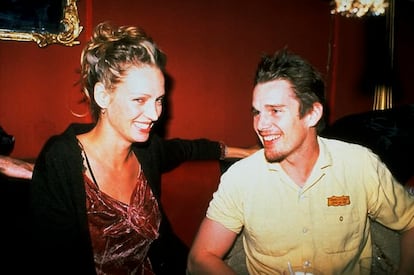
Hawke recognizes himself in that description. He wasn’t a millionaire, but he could certainly afford a better life than the one he was living. But it was important to him to live in a ramshackle apartment. “The same one Henry Miller would have lived in,” he declared. He didn’t want to be Tom Cruise; he wanted to be John Cassavetes.
He was clear about what he wanted to do. He embarked on complicated projects like Michael Almereyda’s urban Hamlet, set up his own theater group adapting the classics, and published his first novel, The Hottest State. “Well, you’re no Chekhov,” his mother said after reading the first draft. It wasn’t Hawke’s worst review. “I remember my favorite review said, ‘Ethan Hawke achieves the impossible. He sucks his own cock.” Chelsea Walls, his directorial debut, didn’t fare much better. “The cinematic equivalent of going to a bar frequented by pretentious, talentless artists who enjoy bemoaning their cruel fate,” said one critic.
As was the case for Reality Bites, time has vindicated the beautiful and stylish Gattaca. The film was a flop at the time, but he met Thurman through it. They were together for seven years and had two children. Of his relationship with Thurman, Hawke told ICON in 2016, “I was looking for a home, security, a foundation, a family through marriage. I was looking for the opposite of what my life was, always exposed to flashbulbs, but I fell in love with someone who only added more flashbulbs to my intimacy. Our marriage became the antithesis of what I wanted, and we found it very difficult to find grounding, a connection cable. I know there are people who can handle it; I have friends who do. For me it was impossible.”
To get through his divorce, Hawke worked twice as hard. He believed that if he gave the media a lot to talk about in his professional life, they wouldn’t talk about his personal life. In 2008, he married Ryan Shawhughes, who had worked briefly as a nanny for his children; Hawke and Shawhughes now have two daughters together.
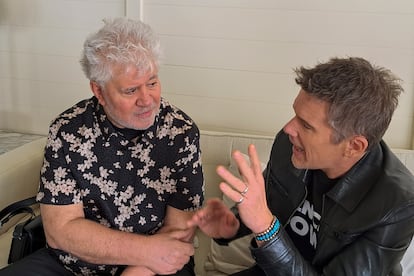
His career has gone through several rough patches. Hawke had to audition twice before he got his role in Training Day. “That was when I knew the ‘90s were over. I was in a unique position, which is that I was only 30 years old, and I was washed up. All my friends were going to audition for Saving Private Ryan. And I couldn’t even get an audition for it, because they knew me and didn’t want me.” Fuqua’s film brought him his first Oscar nomination. Today he has four of them, two for best supporting actor and two for screenwriter.
He is not afraid to take risks that go beyond traditional film roles. He participated in long-term projects like the Before Sunrise trilogy (1995-2013), which tells the story of a couple, and in Boyhood (2014), a beautiful experiment about twelve years in a child’s life. In both projects, he worked alongside Richard Linklater.
His staunch commitment to artistic purity has caused more than one controversy. At a tribute at the Locarno Film Festival, he commented negatively about Marvel, echoing Martin Scorsese’s sentiment. “Now we have the problem that they tell us ‘Logan’ is a great movie. Well, it’s a great superhero movie. It still involves people in tights with metal coming out of their hands. It’s not Bresson. It’s not Bergman. But they talk about it like it is,” Hawke said. Years later, he joined the Marvel Cinematic Universe starring opposite Oscar Isaac in Moon Knight. His daughter Maya was behind that drastic change; she recommended that he make a film that would appeal to the general public.
In recent years, he has been linked to horror films, such as Sinister (2012), Black Phone (2022) and The Purge franchise (2013-2021). Now, Hawke looks around him and sees that the industry has changed. “The most obvious example is that when I was younger, the absolute hallmark of mediocrity was having a fashion contract, having to sell jeans or colognes. Today everything is a commodity to buy.” Perhaps the fact that Saint Laurent produced Strange Way of Life represents another of those changes, but at least he retains his beautiful imperfect smile.
Sign up for our weekly newsletter to get more English-language news coverage from EL PAÍS USA Edition


